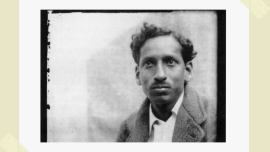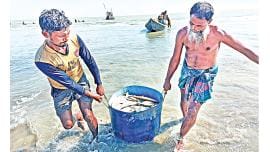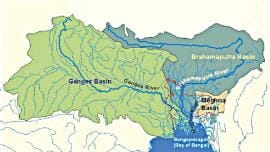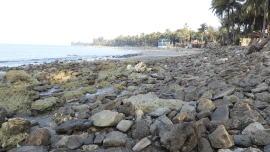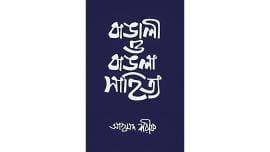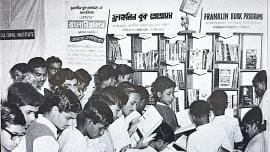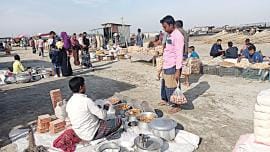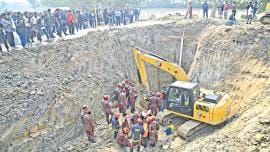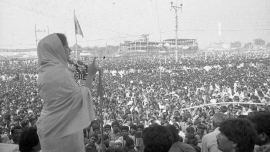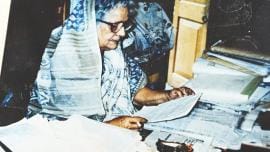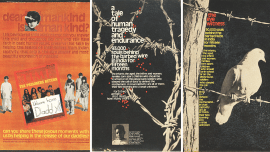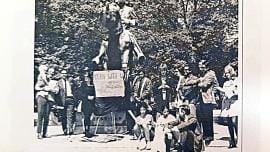Before the selfie age: Daddy’s self-portraits
Daddy’s most widely seen self-portrait was taken in 1951.
Slow Reads
The Tangail saree’s global fame and the weavers we forget
The Tangail saree has travelled far. Once woven quietly in riverside villages, it now appears in fashion catalogues, festival exhibitions, and heritage headlines.
One health, one future: The critical role of Bangladesh’s veterinarians
Bangladesh’s public health story is often told through the lens of hospitals, epidemics, and human suffering.
Why Bangladesh needs a coherent maritime policy
Strategically positioned along the northern edge of the Bay of Bengal, Bangladesh exercises jurisdiction over roughly 118,813 square kilometres of maritime space.
Is the Venezuela operation part of a US–China power struggle?
The operation in Venezuela was therefore about more than drugs, oil, or technological prowess.
Why the Ganges Treaty and shared rivers demand a new imagination
Teesta has led to the collapse of traditional livelihoods in fishing and agriculture.
Slow Reads
Breathing death: What Bangladesh must do to tackle air pollution
One widespread belief is that the worst air is outdoors, and that by staying inside, individuals can avoid its harms.
Slow Reads
The Narsingdi earthquake shook us—are we listening?
The entire Indo-Burma Ranges are being squeezed, potentially building stress on the megathrust that will be released in a large earthquake.
Slow Reads
Saint Martin’s Island is dying — Can we still save it?
A landscape where the natural defences that once protected the island are now dismantled.
Slow Reads
Forgotten Currents / Bengal’s Ties to the Straits World
Medieval Bengal’s links to the Straits world, a narrow stretch of water connecting to Southeast Asia and beyond, are overlooked. This world saw not only ocean-going vessels, but also coastal and localised traffic which, like riverine transport, has gone largely unrecorded.
Slow Reads
In Search of Premodern Bengal’s Literary Treasures
With the passing of Professor Tony K. Stewart, Gertrude Conaway Vanderbilt Chair in Humanities Emeritus, the field of South Asian religions, and more specifically, premodern Bengali literature, has lost one of its leading lights.
Bots
The untold story of Franklin Book Dhaka: In the shadow of the cold war
The Cold War was a war of armaments and ideologies—but it was also a war of words, fought in classrooms, libraries, and on the printed page.
Bots
An ode to winter, sadness and survival
Just as nature does not apologise for winter, our life does not need to justify its slower seasons either.
Slow Reads
Red-green flag and the comfort of forgetting independence
There’s a grief folded into our victory that no celebration can undo.
Slow Reads
D for Dhaka, D for Death
Luck— you need a lot of it to stay alive in this city. And also a sense of dark humour.
Slow Reads
Lives of divorced single mothers: What choice costs in a judgmental society
Society will only see the fact that a woman is a divorcee; nobody will try to look beyond that “label”.
Slow Reads
Why coastal communities don’t get enough milk and vegetables
The Ashtomashi Badh, or eight-month embankment, historically shaped the southwest coast of Bangladesh into an ek fosholer desh—a single-crop landscape—where peasants cultivated rice once a year using fresh water.
Slow Reads
We don’t need zoos, only safe places for wild animals
At the beginning of December, a lioness named Daisy slipped out of her cage at Mirpur National Zoo for a few hours, sparking panic and a rushed evacuation.
Slow Reads
How many more deaths before mob violence is stopped?
But beneath the surface of religious fervour lay a more calculated motive.
Slow Reads
Char Haats: The unequal economics of the chars
For char residents, this unequal exchange is not new.
Slow Reads
Digging deeper into Barind’s water crisis
Farmers speak from lived experience, and their stories reveal the uneven spread of crisis across the region.
Slow Reads
A grieving street dog and reflections on environmental humanities
This human-made tragedy, however, was partially remedied by "humans" themselves.
Slow Reads
Myanmar’s hollow election: Rohingyas’ fate and Bangladesh’s geopolitical stake
For Bangladesh, the geopolitical stakes are profound and multifaceted.
Slow Reads
Why global crises are pushing the world towards renewables
The urgency to move away from fossil fuels and into renewables isn’t just about climate change anymore.
Opinion
The BRICS equation behind the Israel-Iran conflict
The Israel-Iran conflict is about who defines global legitimacy.
Opinion
Bangladesh and India's new strategic dilemma
When evaluating India's current position, it is essential to consider broader geopolitical developments.
Opinion
In Focus / The untold history of why Khaleda Zia entered politics
Why did Khaleda Zia, a typical housewife who had become widow at a critical age in terms of Bangladesh's culture, join politics?
Slow Reads
In Focus / Nurjahan Begum at 100: A life for women’s voices
Begum had to shift from its office from one country to another, witness Partition, Liberation War, change of regimes, change in printing technology, but its editor, Nurjahan Begum, never wavered.
Slow Reads
Thoughts on press freedom and about a Dhaka weekly that died without a bang
For an aspiring journalist like myself, there could not have been a better training ground than the East Bengal Times.
Slow Reads
The war after the war: Pakistan’s POWs and postal propaganda
Postal evidence supports the view that a propaganda campaign was underway as soon as the army surrendered.
Slow Reads
Missionaries in the war zone: Australian Baptists and the birth of Bangladesh
In Bangladesh, the Australian Baptist Missionary Society (ABMS) had workers in Mymensingh, Kulpotak and Joyramkura.
Slow Reads
The Bangladeshi diaspora in Britain: A forgotten front of 1971
By 1971, Britain’s Bengali community, though modest in size, had established footholds across the industrial heartland: London, Birmingham, Manchester, Bradford, Luton, Coventry, Sheffield, and Oldham.
Slow Reads
American doctors who exposed the Nixon-Kissinger lies
Due to its strong ties to Pakistan as a Cold War ally, the Nixon administration declined to recognise the genocide.
Slow Reads
